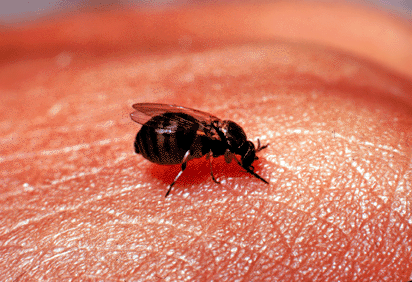As a poultry owner, it’s important to understand how insects can pose a risk of danger or disease to your flock. While spring is an exciting time for many, seasonal rains and warm, humid weather across states, including those in Central, Northern, and even Southern areas, often lead to an increase in mosquito and black fly populations. Across the nation, the months of April, May, and June are a prime season for swarms of buffalo gnats (also called black flies or turkey gnats).
WHAT IS THE RISK BUFFALO GNATS POSE TO BACKYARD CHICKENS, POULTRY, AND OTHER LIVESTOCK?
Black flies (Simulliidae family) are small, rounded flies measuring barely an eighth of an inch in length. Black flies often attack in swarms, and livestock and chickens can actually die from bites, so keeping them away from your flock is a priority. Deaths from these swarms are due to acute toxemia and anaphylactic shock caused by toxins introduced within black fly saliva, suffocation from swarming flies obstructing the animal’s airway, blood loss, or by contracting leucocytozoonosis (see Merck: Leucocytozoonosis in Poultry).
In recent years, flock owners have reported chicken deaths after swarms of the black flies, or gnats, have attacked their flocks. According to the Iowa Department of Agriculture and Land Stewardship (IDALS), in 2018, an investigation showed sudden death/loss in flocks backyard chickens after buffalo gnats were seen swarming chickens. A necropsy revealed several black flies in the oropharyngeal cavity and trachea. That same spring, the International Society for Infectious Diseases released an alert stating that livestock producers in the Arkansas delta were working to protect their animals after a population explosion of black flies was blamed for the deaths of a bull and cow, as well as the closure of a nature center. Other states from Maine to Louisiana also reported black fly problems during that same timeframe.
CONTROLLING BLACK FLY (BUFFALO GNAT) POPULATIONS
Male black flies feed only on the nectar of flowering plants, but the females seek blood to nourish their developing eggs. Unlike mosquitoes that breed in stagnant water, black flies can breed in virtually any flowing water — often fast-moving creeks and rivers. This makes control extremely difficult because running water is often near poultry flocks and livestock. Adult flies will travel 10+ miles in search of blood.
Black flies like warm, humid weather and are attracted to the carbon dioxide exhaled by people and animals, as well as perspiration, fragrances, and dark, moving objects. They are most active just after sunrise and before sunset on calm days. Avoiding infested areas at these times is the best means of prevention.
How can you protect your flock or livestock? Here are a few tips:
- Keep Your Flock Cooped — The best means of prevention and protecting your chickens, ducks, geese, turkeys and other poultry from black flies by keeping them cooped. Black flies rarely enter shelters.
- Use Screen Mesh to Your Coop and Run — The flies can pass through tiny spaces, so covering coops with screens of 24 mesh per inch (2.54 cm) or smaller is needed. It’s important to note that screen mesh is not predator-proof for larger animals, so we recommend layering the mesh over hardware cloth for better flock protection.
- Use Fans for Air Movement — Experts also recommend using fans as air movement to help deter the flies.
Experts Weigh In on Controlling Buffalo Gnats in Poultry
 “Keep your flocks cooped and secure any openings. Aside from confining poultry indoors with fine mesh screens covering openings and a running fan to keep air circulating inside the coop, not much else can be done but wait the several weeks until the black flies naturally abate.”
“Keep your flocks cooped and secure any openings. Aside from confining poultry indoors with fine mesh screens covering openings and a running fan to keep air circulating inside the coop, not much else can be done but wait the several weeks until the black flies naturally abate.”
— Gail Damerow, poultry expert and best-selling author
Unfortunately, using pesticides for black fly control often has limited success. In some situations, liquid residual pesticides may be effective when applied to surfaces where flies land. Below are a few options to try if securing your flock in their coop isn’t enough:
- Permethrin Spray — Spray permethrin aerosol inside crevices and in the areas of gnat activity. The spray is an insecticide and will kill the gnats using chemicals, so be sure to read the label regarding use around animals.
- Essentria Insecticide Concentrate — Quick control with residual protection. Multi-purpose: for indoor, outdoor, fogging, turf and ornamental, on animal and mosquito misting applications, vegetables, fruit trees (both bearing and non-bearing), pasture and range, nursery and greenhouse. Contains natural essential plant oils with fresh scent.
- Insectrin X — A long-lasting livestock and premise spray that provides quick knockdown, broad-spectrum insect control for up to 28 days. Active ingredient is Permethrin, a safe insecticide for use outdoors, in homes in non-food areas, barns, coops, and kennels. Controls poultry lice, fowl mites, ticks, fleas, flies, and numerous other insects. This concentrated product, and when mixed with water, will make 12.5 gallons of spray.
- Prozap Insectrin Dust — This ready-to-use insecticide dust controls horn flies, lice and aid in the control of face flies on horses, beef, and dairy cattle. Controls Northern Fowl Mite, lice on swine and northern fowl mites, chicken mites and lice on or around poultry. Just one pound will treat one hundred birds. Always read all the label safety instructions before use.
- Mite Strips — Permethrin mite strips are an efficient and economical option to help protect your flocks.
- Some poultry producers have reported success with products containing Citronella or Vanilla oil.
- Gnat foggers will kill gnats currently present in your area. This option will not kill unborn gnats or adult gnats not currently in the area. Therefore, it is not a permanent solution and requires multiple foggings as gnats return. This may also require you to relocate your flock temporarily during treatment.
Experts Weigh In on Controlling Buffalo Gnats in Poultry
 “According to some papers published with similar outbreaks, various pesticide type products such as Permectrin II and Ravap may also be used directly on birds to help repel biting black flies (Jones, et al. Avian Diseases, 59:24-30, 2015). In addition, other cofactors producing stress such as concurrent diseases and environmental factors (bird movement, heat, etc.) can also increase mortality rates.”
“According to some papers published with similar outbreaks, various pesticide type products such as Permectrin II and Ravap may also be used directly on birds to help repel biting black flies (Jones, et al. Avian Diseases, 59:24-30, 2015). In addition, other cofactors producing stress such as concurrent diseases and environmental factors (bird movement, heat, etc.) can also increase mortality rates.”
— Yuko Sato DVM, MS, Diplomate ACPV Associate Professor, Veterinary Diagnostic Laboratory, Vet Diagnostic & Production Animal Medicine.
OTHER RESOURCES AND INFORMATION:
Iowa Department of Agriculture and Land Stewardship
University of Arkansas Extension on Black Flies
Iowa State University Extension on Black Flies
Texas A&M Agrilife Extension on Black Flies
Photo credit: Wikipedia

